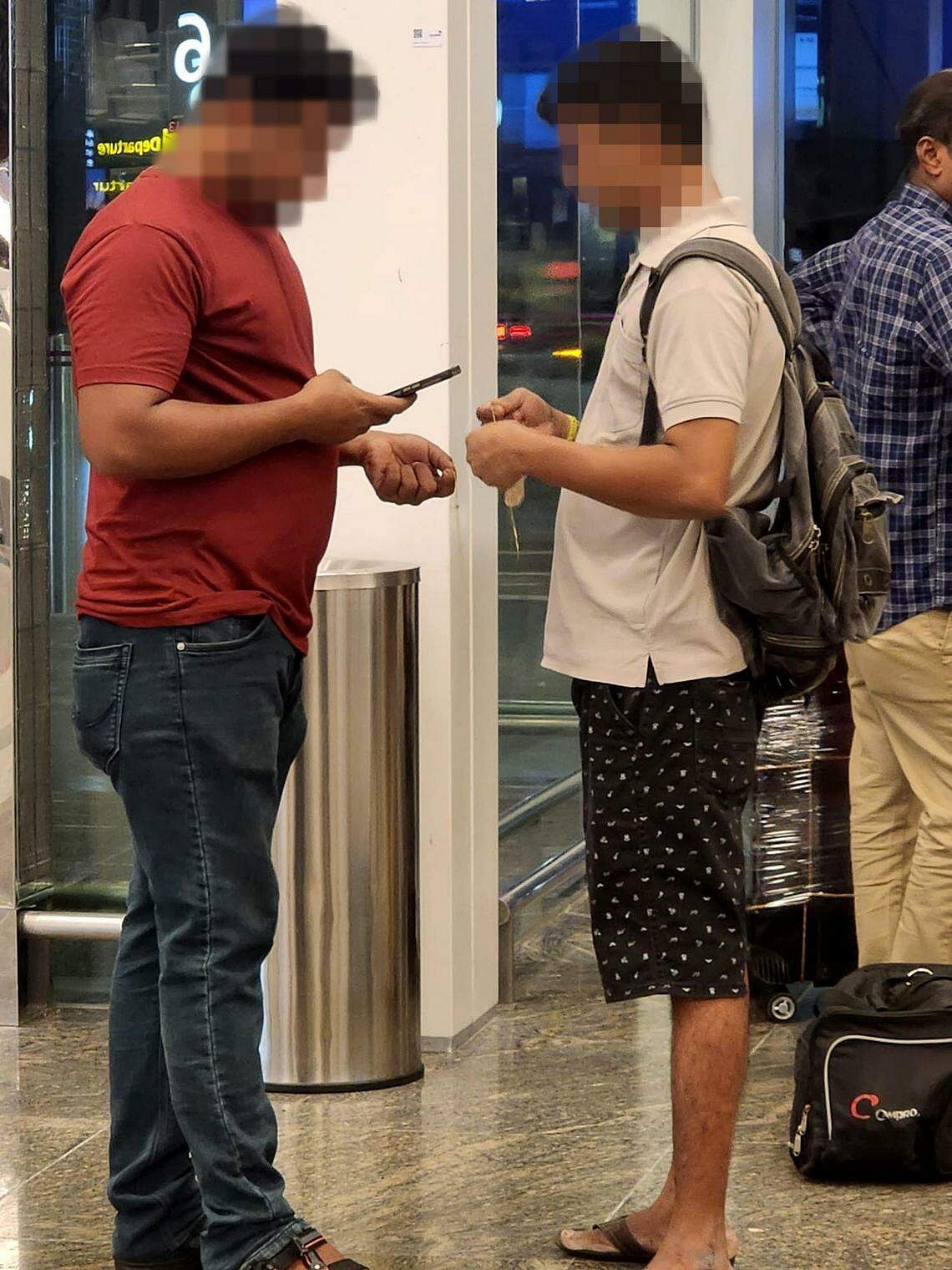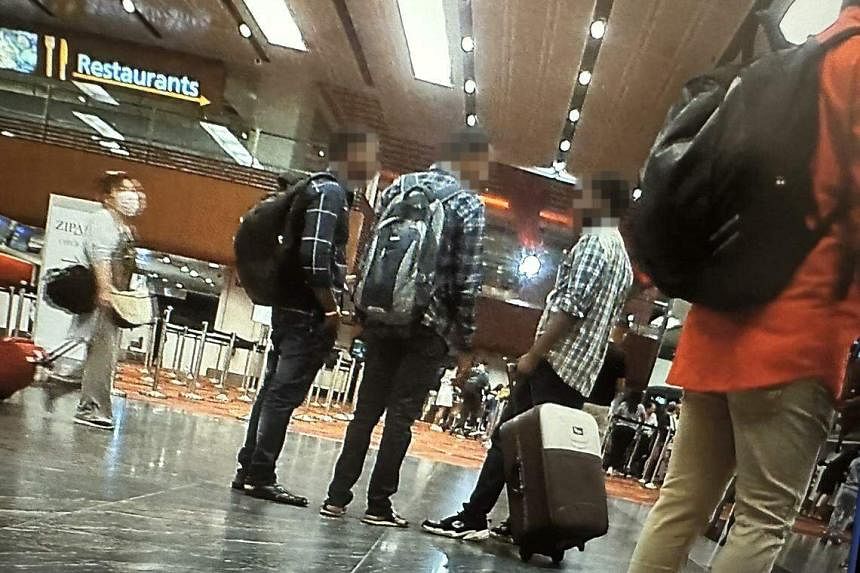Smugglers approaching migrant workers in Changi Airport to act as 'gold mules'


SINGAPORE - The authorities in India, including Customs officials, are on the lookout for travellers acting as “gold mules”, who return home with jewellery they had agreed to carry for a fee.
This comes in the wake of a spike in gold smuggling to the country, and amid reports of syndicates targeting travellers at various airports in jurisdictions in the Gulf, as well as in Asia, including Malaysia and Singapore, where gold is cheaper than in India.
According to media reports, the crime is so pervasive that in September 2023, 113 out of 186 passengers on a Chennai-bound flight from Muscat, Oman, were arrested for conspiring to smuggle gold and electronic goods.
The Indian Customs caught them with 13kg of gold, more than 200 mobile phones, laptops and cigarettes. It was reported that smugglers had influenced the passengers with chocolates and perfumes as commission.
The Straits Times learnt that smugglers have been approaching Indian migrant workers flying home via Changi Airport Terminal 1.
Travellers who show an interest in being a gold mule are directed to a quiet spot in the airport, where a deal is struck. During negotiations, the courier is assured that a syndicate runner will retrieve the gold jewellery from him when he lands in India.
Mr Mohamed Bilal, the president of the Gem Traders Association of Singapore, said that while it is not illegal in Singapore for travellers to carry precious metals, including gold, out of the country, the couriers risk breaking the law in India when they do not declare the gold they are carrying in.
Male Indian nationals are permitted to carry up to 20g of duty-free gold, of a maximum value of 50,000 rupees ($800), into India. The limit for female Indian nationals is double in terms of weight and value.
Gold jewellery carried over and above these limits will attract Customs duty.
Mr Bilal said that the practice has been going on for decades, adding that Singapore’s gold is prized due to its quality.
ST had observed the activities on separate occasions from July 2023. The men who approach the passengers work as runners for bosses who observe the proceedings from a safe distance.
These runners often carry palm-sized bags which contain gold jewellery.
Gold smuggling in India has seen a spike in seizures and amount discovered in recent years.
In March 2023, The Hindu newspaper reported that there was a total of 3,982 seizures in 2022, involving 3,502kg of gold.
This compared with 2,445 seizures (2,383kg of gold) in the previous year and 2,567 seizures (2,154kg) in 2020.
The World Gold Council said in a report that gold smuggling in India spiked after the import duty of gold was raised in July 2022 to 12.5 per cent from 7.5 per cent.
The smuggled gold was detected at land borders such as Nepal, Myanmar and Bangladesh, as well as at India’s international airports, Mr Sanjay Kumar Agarwal, chairman of the Central Board of Excise and Customs, said in October 2023.
According to media reports, syndicates have hidden small gold bars in belts, toys, luggage lining and even shoes.
Sometimes, smugglers also bring in gold dust or paste. Indian Customs learnt that some of the passengers arrested had been to Gulf countries on “sponsored trips”, and returned with gold hidden in their luggage.
Among the smuggled gold uncovered by the Indian authorities, some came from flights originating from Dubai, Malaysia and Singapore.
ST understands that the gold smuggling runners at Terminal 1 want the mules to carry jewellery of between 25g and 30g of gold, which is just outside the legal limit.
Nanyang Technological University associate professor of accounting Kelvin Law said there are two reasons why gold is one of the favourite instruments to move funds out of countries.
“First, there is an extremely high demand for gold in countries like India,” said Prof Law, who specialises in corporate taxation, financial fraud and sustainability.
“Second, the ability to melt down and reconstitute gold means its origins become virtually untraceable. Once melted, it is impossible to determine where the gold was mined or processed.”
He said there is some concern about the opacity of the gold’s origin and ultimate usage.
“There are anecdotes that the smuggling of gold can be tied to illicit financial activities and money laundering by organised criminal syndicates.
“These operations often involve gold powder smuggled from conflict or high-risk areas, which, upon reaching its final destination via intermediary countries, is melted down in local refineries,” added Prof Law.
He said the concern is the integration of proceeds from these sales into the local financial network, potentially for illicit purposes.
“Such activities pose a risk to our financial reputation and potentially implicate us in global networks of financial crime, especially considering the high global media exposure of the money laundering case here,” he said, referring to the 10 foreigners arrested in a $2.8 billion money laundering probe.
Prof Law said it will not be easy to tackle the smuggling issue, as the gold being taken to India by an individual migrant worker is close to the legal limits.
“One strategy would be to treat the act of passing/receiving gold at Changi Airport as unauthorised commercial activities,” he added.
“Airports generally have strict regulations about commercial activities within their premises.
“By defining the transfer of gold by syndicates as an unauthorised commercial activity, the airport authorities can leverage existing rules and regulations to take action against these activities,” he said.

Mr Alan Tan, senior vice-president (Aerodrome Safety & Aviation Security) at Changi Airport Group, said suspicious cases of harassment of passengers are referred to the authorities for action.
“We encourage travellers to be vigilant and take precautions to protect themselves from risks associated with carrying goods on behalf of strangers,” he added.
The runners, who work in groups of up to three men, are believed to be work permit holders.
While it may be legal to take gold out of Singapore, lawyer Ramesh Tiwary said the runners may be breaking other laws here.
“You cannot moonlight when you are given a work permit to do a specific job in Singapore. This is in breach of our laws,” he added.
A migrant worker who moonlights may be fined up to $5,000, or jailed up to 12 months, or both.
There is no weight limit on the amount of gold and other precious metals that can be transported out of Singapore by travellers, the Singapore Police Force said.
The Government previously said that in line with international standards set by the Financial Action Task Force to combat money laundering and terrorist financing, the country’s measures and controls are focused on the point of sale of such items in Singapore.
On July 17, ST spotted runners from three different groups approaching Indian nationals at Changi Airport.
A migrant worker from India recorded the conversations he had with the runners.
Mr Subhash, who declined to give his full name, said he was at the departure hall at Changi Airport Terminal 1 for a few minutes when two men approached him and quizzed him on his travel plans. He was headed back to Chennai.

The Indian national said he was not surprised when they proposed he work for them as a gold smuggling mule.
Mr Subhash said his employers had warned him in 2019, when he first moved to Singapore, about the consequences of smuggling gold back to India.
In less than 30 minutes, the construction worker in his late 20s said he was approached by three separate groups of men, all with the same proposal.
Mr Subhash said: “They wanted me to carry for them between 25g and 30g of gold, and said they will give me 5,000 rupees.
“I pretended by asking if it was legal. They all told me it was.”
In India, the world’s second-biggest gold consumer, 1g of 24 karat gold costs about $99. It would cost about $92.40 in Singapore.
Mr Subhash would have carried gold valued between $2,075 and $2,490 if he had agreed to smuggle the gold chain weighing between 25g and 30g.
Mr Subhash said: “They (runners) knew the flight times, and had asked to see my passport and boarding ticket.
“They said they must take a photo of me if I agree to their plan so that their people can identify me when I land and pick up the gold chain from me.”
Mr Subhash said one runner tried to reassure him that nothing will happen if he keeps the gold chain in his pocket.
“I was told that arrangements have already been made with a Customs officer as my photo would be sent to him to avoid any issues.
“He told me to say ‘I have nothing on me’ when I am questioned by Customs in India,” said Mr Subhash, who added that he did not agree to be a mule.
Prof Law said syndicates using returned workers unwittingly to smuggle gold in quantities just above legal thresholds shows a sophisticated understanding of regulatory loopholes and a high level of coordination.
“These raise concerns about the extent of the organisational capabilities of these unknown syndicates or individuals,” said Prof Law.
“The sophistication in evading detection suggests the potential possibility of other, more serious activities – illicit or not – being conducted with similar methods via returned workers.”
Lawyer Hamidul Haq said the issue here is whether migrant workers are aware that they could potentially be working for organised crime.
“If ‘yes’, (then) there is possibly an offence even though taking gold out by itself may not be an offence on its own,” said Mr Hamidul.
ALSO READ: Singaporean mother, daughter arrested for allegedly smuggling over 14kg of cocaine into Philippines
This article was first published in The Straits Times. Permission required for reproduction.